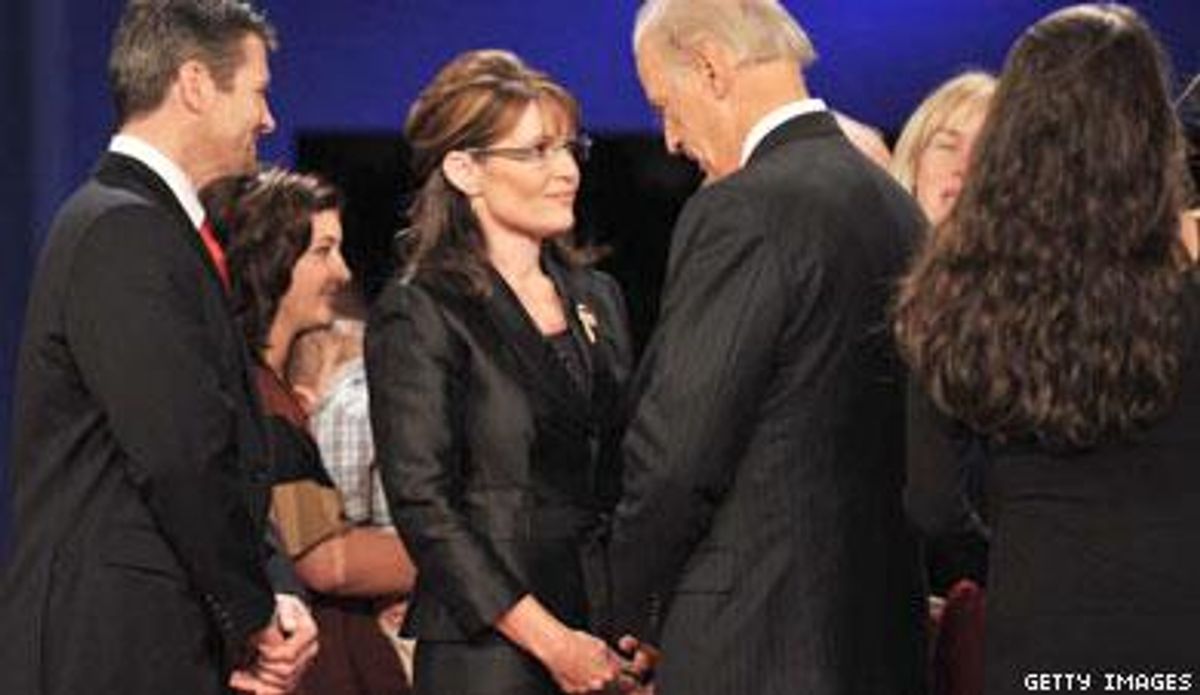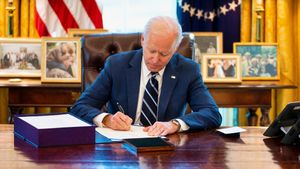Do Sen. Joe Biden
and Gov. Sarah Palin agree on the rights of same-sex
couples? That may have been the impression of some viewers
based on the exchange they had during the first and
only vice-presidential debate Thursday night.
It started when
moderator Gwen Ifill asked Senator Biden if he supported
providing benefits for same-sex couples, as they currently
do for partners of state employees in Alaska.
"Absolutely," Biden said. "Do I support
granting same-sex benefits? Absolutely, positively.
Look, in an Obama-Biden administration, there will be
absolutely no distinction from a constitutional standpoint
or a legal standpoint between a same-sex and a
heterosexual couple.
Biden then moved
beyond benefits to detail the rights he and Sen. Barack
Obama believe gay couples should have. "The fact of
the matter is that under the Constitution we should be
granted -- same-sex couples should be able to have
visitation rights in hospitals, joint ownership of property,
life insurance policies, etc. That's only fair," he
said. "It's what the Constitution calls for.
And so we do support it. We do support making sure
that committed couples in a same-sex marriage are guaranteed
the same constitutional benefits as it relates to
their property rights, their rights of visitation,
their rights to insurance, their rights of ownership
as heterosexual couples do."
At that point,
Ifill turned to Governor Palin and asked if she supported
extending Alaska's policy of providing same-sex
partner benefits to the rest of the country.
"Well, not
if it goes closer and closer towards redefining the
traditional definition of marriage between one man and one
woman. And unfortunately, that's sometimes where those
steps lead," Palin responded, adding that her
answer shouldn't be taken to mean that she would
"be anything but tolerant of adults in America
choosing their partners, choosing relationships that
they deem best for themselves."
But in contrast
to Biden, rather than affirming that same-sex couples
need certain protections in order to ensure that they are
afforded similar rights to straight couples, Palin
simply asserted that she and John McCain would never
purposely deprive gay couples of those rights.
"No one
would ever propose, not in a McCain-Palin administration, to
do anything to prohibit, say, visitations in a
hospital or contracts being signed, negotiated between
parties," Palin said, adding, "But I will tell
Americans straight up that I don't support defining marriage
as anything but between one man and one
woman."?
Ifill redirected
to Biden: "Senator, do you support gay
marriage?"
"No.
[Neither] Barack Obama nor I support redefining from a civil
side what constitutes marriage. We do not support
that," Biden said.
Biden then
circled back to the concept of equal rights, trying to pin
Palin down on whether she believed gay couples should have
the same constitutional rights -- presumably via civil
unions or domestic partnerships -- as heterosexual
couples.
"The
bottom line though is, and I'm glad to hear the governor, I
take her at her word, obviously, that she thinks there
should be no civil rights distinction, none
whatsoever, between a committed gay couple and a
committed heterosexual couple," Biden said.
"If that's the case, we really don't have a
difference."
"Is that
what you said?" asked Ifill.
But Palin stuck
to the definition of marriage rather than engaging the
topic of constitutional rights. "Your question
to him was whether he supported gay marriage and my
answer is the same as his and it is that I do
not," she said.
Ifill concluded,
"Wonderful. You agree. On that note, let's move to
foreign policy."
The nuanced
discussion may well have been lost on average viewers, who
easily could have walked away thinking that the two
candidates hold essentially the same view: They do not
support gay marriage. But Senator Biden argued that
same-sex couples should be treated equally under the
law and afforded all the same rights and responsibilities as
straight married couples.
Governor Palin
did not clarify whether she agreed with Biden on that
point. Based on past statements, one might reasonably
deduce that she does not. Although she did
veto a bill in Alaska that would have denied health
benefits to partners of state employees, she did so at the
urging of her attorney general, who argued that signing the
bill would have been a violation of the state
constitution as interpreted by Alaska's highest
court. At the time, Palin said she personally disagreed
with providing same-sex partner benefits but was legally
compelled as governor to kill the bill.
Senator Obama
supports civil unions that provide equal rights and
responsibilities to gay couples. Senator McCain has
indicated that he is opposed to civil unions --
or any agreement -- that nears the legal
equivalent of marriage.
Overall, the
discourse around gay marriage was reminiscent of other
portions of the debate: Joe Biden generally went into
greater depth on the issues and Sarah Palin
usually stuck to a certain set of talking points.
Most pundits
agreed that while Governor Palin exceeded expectations,
Senator Biden demonstrated greater fluency with the subject
matter.
Early polls
suggested that viewers agreed: CNN found debate watchers
thought Biden won the night by a margin of 51% to 36%;
CBS surveyed uncommitted voters, who favored Biden
over Palin 46% to 21%, with 33% of them calling
it a draw.

















































































